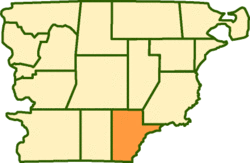Bahía Bustamante
Bahía Bustamante | |
|---|---|
Municipality and village | |
 Municipal locator | |
| Coordinates: 45°08′S 66°32′W / 45.133°S 66.533°W | |
| Country | |
| Province | Chubut Province |
| Department | Escalante Department |
| Government | |
| • Type | Mayor |
| Population (2011) | |
| • Total | 40 |
| Time zone | UTC−3 (ART) |
| Area code | 0297 |
| Website | www.bahiabustamante.com |
Bahía Bustamante is a village and municipality in the Escalante Department of the Chubut Province in southern Argentina.[1] The village was established in 1953. It is located 180 km north of Comodoro Rivadavia and 250 km south of Trelew.
This is the only town in Argentina, dedicated to collecting seaweed and mussel [citation needed]. It has a nature reserve where about 4000 sea lions live, colonies of more than 50, 000 penguins, 22 species of birds, white sand beaches and a petrified forest. The village was featured in several travel articles in March 2011.[2][3][4]
Population
[edit]Bahía Bustamante had a population of 40 people in March 2011, representing a marked increase compared to 11 in the 2001 census. The gender distribution in 2001 was 10 males to one female.[5]
History
[edit]Don Lorenzo Soriano (Baeza, Jaén Spain, 1901-1987) visited the area in 1953, looking for seaweed to extract colloid that allowed him to continue with the production of the Malvik hairspray, an activity that began in 1947. After visiting the Patagonian coast in search of seaweed, he discovered Bahia Bustamante, known locally as Bahia Podrida (Rotten Bay) due to the accumulation of seaweed in a state of putrefaction. He performed the first assessment and then, with his children, he began collecting seaweed, giving rise to this unique seaweed town.
At first there were only two buildings facing the sea. There they installed and began to build what is now Bahia Bustamante. They built houses and rooms for more than 400 employees, a school, church, police station, warehouses, workshops and a procurement store, among other facilities.
Thus this small town was born in a lonely place in Patagonia, surviving on natural resources. From 2004, in addition to its agricultural activities, tourism activities were added, opening its doors to those who want to enjoy an incredible nature.
In 2009[6] the Patagonia Austral Interjurisdictional Coastal Marine Park was created, which includes Bahia Bustamante.
Activities
[edit]With its many geographical features and its sounds and solitude, Bahia Bustamante is a paradise to discover. Depending on the state of the tide and weather, every day is defined by exploration activities in the area. Ideal for nature lovers, it offers various activities such as bird and sea lion watching, visits to the Petrified Forest, demonstrations of the seaweed industry, visits to a typical Patagonian ranch, hiking, horseback riding and mountain biking. It is also possible to enjoy the unique white sand beaches and crystal clear water, framed by reddish-colored rocks, which provide an incredible framework of textures and colours.
References
[edit]- ^ Ministerio del Interior (in Spanish)
- ^ Pergament, Danielle (2011-03-04). "Bahia Bustamante - Argentina's Secret (and Private) Answer to the Galapagos - NYTimes.com". Patagonia (Argentina): Travel.nytimes.com. Retrieved 2012-07-07.
- ^ "Finding Bliss in Bahia Bustamante - Slide Show". The New York Times. Argentina;Patagonia (Argentina). 2011-03-06. Retrieved 2012-07-07.
- ^ Matias Puga. "Bahia Bustamante, Patagonia Argentina". Patagonline.com. Retrieved 2023-04-26.
- ^ "Archived copy". Archived from the original on 2007-11-28. Retrieved 2012-07-07.
{{cite web}}: CS1 maint: archived copy as title (link) - ^ "Parque Interjurisdiccional Marino Costero Patagonia Austral". 10 June 2019.


 French
French Deutsch
Deutsch